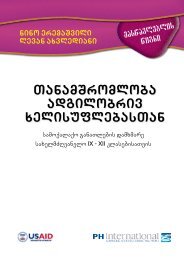The Geneva Protocol, by David Hunter Miller
The Geneva Protocol, by David Hunter Miller
The Geneva Protocol, by David Hunter Miller
Create successful ePaper yourself
Turn your PDF publications into a flip-book with our unique Google optimized e-Paper software.
CHAPTER XX. 109<br />
(a) Compulsory arbitration at the request of one of the parties;<br />
(b) A unanimous decision <strong>by</strong> the Council;<br />
(c) Compulsory arbitration enjoined <strong>by</strong> the Council.<br />
Appropriate methods are laid down for all three cases.<br />
Article 4, paragraph 2.<br />
First case of Compulsory Arbitration.--If the parties, being called upon <strong>by</strong> the Council to submit their dispute<br />
to a judicial or arbitral settlement, do not succeed in coming to an agreement on the subject, there is no<br />
question of optional arbitration, but if a single party desires arbitration, arbitration immediately becomes<br />
compulsory.<br />
<strong>The</strong> dispute is then ipso facto referred to a Committee of Arbitrators, which must be constituted within such<br />
time limit as the Council shall fix.<br />
{176}<br />
Full liberty is left to the parties themselves to constitute this Committee of Arbitrators. <strong>The</strong>y may agree<br />
between themselves in regard to the number, names and powers of the arbitrators and the procedure. It is to be<br />
understood that the word "powers" is to be taken in the widest sense, including, inter alia, the questions to be<br />
put.<br />
It was not considered desirable to develop this idea further. It appeared to be sufficient to state that any result<br />
which could be obtained <strong>by</strong> means of an agreement between the parties was preferable to any other solution.<br />
It also appeared inexpedient to define precisely the powers which should be conferred upon the arbitrators.<br />
This is a matter which depends upon the circumstances of each particular case. According to the case, the<br />
arbitrators, as is said above, may fill the rôle of judges giving decisions of pure law or may have the function<br />
of arranging an amicable settlement with power to take account of considerations of equity.<br />
It has not been thought necessary to lay this down in the form of a rule. It has appeared preferable to leave it<br />
in each case to the parties to agree between themselves to decide the matter according to the circumstances of<br />
the case.<br />
Nevertheless, consideration has been given to the possibility that the arbitrators need not necessarily be jurists.<br />
It has therefore been decided that, when called upon to deal with points of law, they shall, if one of the parties<br />
so desires, request, through the medium of the Council, the advisory opinion of the Permanent Court of<br />
International Justice, which must, in such a case, meet with the utmost possible despatch. <strong>The</strong> opinion of the<br />
Court is obtained for the assistance of the arbitrators; it is not legally binding upon them, although its<br />
scientific authority must, in all cases, exercise a strong influence upon their judgment. With a view to<br />
preventing abusively frequent consultations of this kind, it is understood that the opinion of the Court in<br />
regard to disputed points of law can only be asked on a single occasion in the course of each case.<br />
{177}<br />
<strong>The</strong> extension which, in the new system of pacific settlement of disputes, has been given to the advisory<br />
procedure of the Court has suggested the idea that it might be desirable to examine whether, even in such<br />
cases, it might not be well to adopt the system of adding national judges which at present only obtains in<br />
litigious proceedings, and also that of applying to the advisory procedure the provisions of Article 24 of the
















